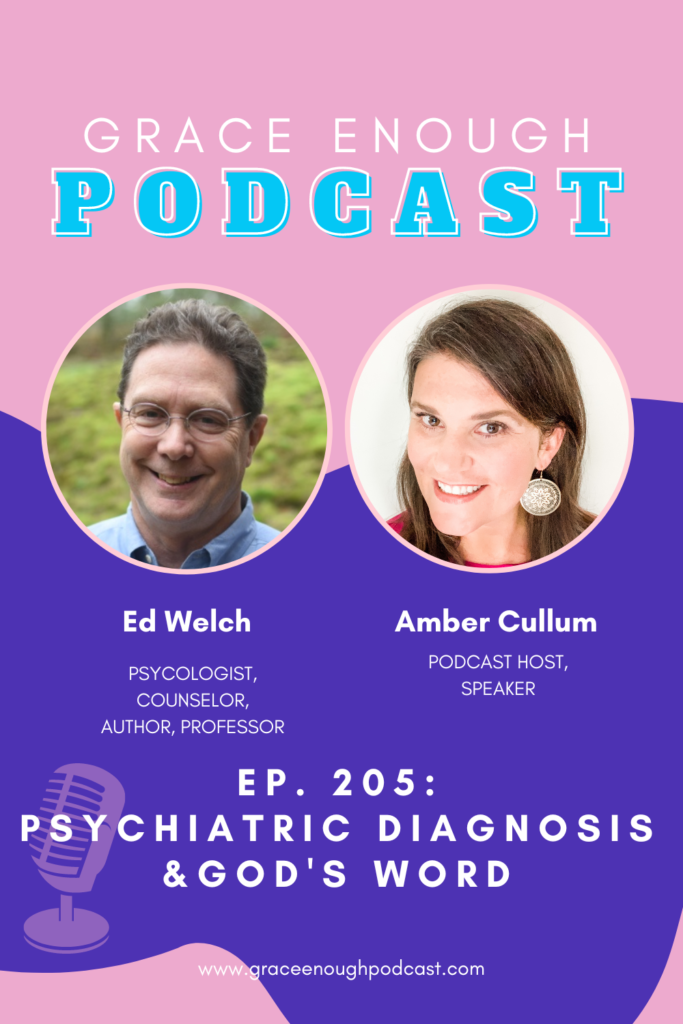
Edward T. Welch, MDiv, PhD, is a licensed psychologist and faculty member at CCEF. He earned a PhD in counseling (neuropsychology) from the University of Utah and has a Master ofDivinity degree from Biblical Theological Seminary.
Welch has been counseling for over forty years and has written extensively on the topics of depression, fear, and addictions.
His biblical counseling books include Shame Interrupted, When People Are Big and God Is Small, Addictions: A Banquet in the Grave, Depression: Looking Up from the Stubborn Darkness, Running Scared: Fear, Worry, and the God of Rest, A Small Book about a Big Problem, A Small Book for the Anxious Heart, A Small Book about Why We Hide, and I Have a Psychiatric Diagnosis.
So you never miss a new episode.
Ed Welch and Amber discuss coming at those living with a psychiatric diagnosis from broader category of “in this world you will have trouble” and how instances of suffering in the Bible can be applied to mental health. They also discuss, the place medication holds in the life of the sufferer and how Jesus speaks into the pain.
“All theology should be applied Theology. If it doesn’t reach into how we live… in the details of life, then somehow we haven’t understood it fully, quite yet.”
“If you speak about diagnoses without having a familiarity with them, either by way of your own experience or by way of those that you love, you will say things that are probably not going to be that helpful. Even if they’re true, they might not be that helpful.”
“It’s still rare to find psychiatric diagnoses used as an illustration in the sermon. and until those things are spoken of in a pulpit, they still will remain in the shadows more than we would like.”
“If we understand that psychiatric diagnoses are best… brought into Scripture under this much broader category of human suffering, “In this world, you will have trouble.” And in that category, almost every page of Scripture speaks about the troubles of life and how do we turn to Christ in the midst of those particular arduous struggles? And how do we learn patient endurance and words of hope and on and on. Then it is everywhere in scripture.”
“Those are the two features of love: patience, and kindness.”
” ‘Help me to understand what is it like for you? You’re talking about something that I haven’t experienced myself, so could you please bring me into this?’ That’s, the way the church is going to become more adept at praying for and helping people.”
“If we have something, a trouble that is, life dominating and intrusive throughout the day, in a way that’s a hindrance to life, God has to speak to it. If he doesn’t…what good is scripture? If the Lord doesn’t speak meaningfully with compassion and hope and understanding to the daily struggles of life, you can see how his words just become something for the buy and buy. They become something for the distant future rather than for today.”
“In this particular era, there are medications for a lot of different psychiatric struggles that do seem to be able to diminish the symptoms. And when the pain is that intense, if the symptoms can be diminished a little tiny bit, we can be grateful for that.”
“The anxieties of life are an occasion where we say, ‘Help.’ We say, ‘Lord help’.”
“When we don’t know or don’t hear the words of Jesus to us in a way that they’re good for our souls, what do we do? We ask other people to pray for us. We ask other people for help.”
“We ask for help if the connection between our anxiety and the good words of Jesus Christ are getting a little fuzzy.”
“What are the good words that you hear from Jesus?…What is the passage that is good for your soul?”
“When we find a word in the Psalms that captures our experience, we are brought into the very sufferings of Jesus.”
“We don’t want anything in our hearts to be partitioned from Jesus.”
“A person who loves, it’s the way we move into all psychiatric struggles. ‘This is something I don’t understand. It’s different than my own experience, so help me to understand what life is like for you.’ The more we know another person. The better we understand some of their strengths and weaknesses, the more patient we will become.”
“Patience is a form of love. When we begin to love the other person well in the midst of their struggle, that’s when we will become love. Love tends to be more creative, anger and frustration just get’s loud.”
“He speaks to his individual sheep, the individual sheep that is hurt. He speaks to them in particular, and His words are really good.”



Don’t worry, your information will not be shared, nor will I spam you 🙂
© Grace Enough Podcast2024